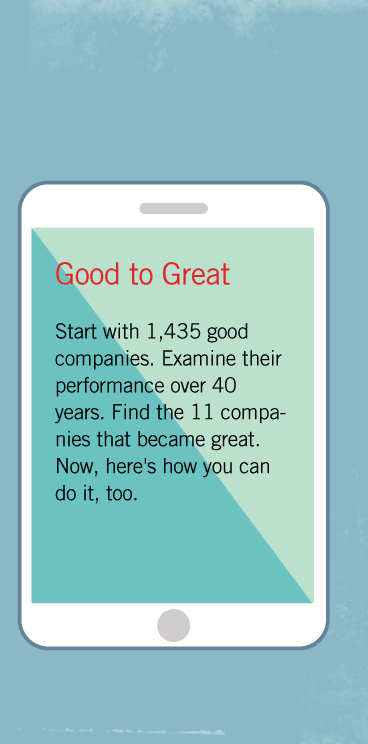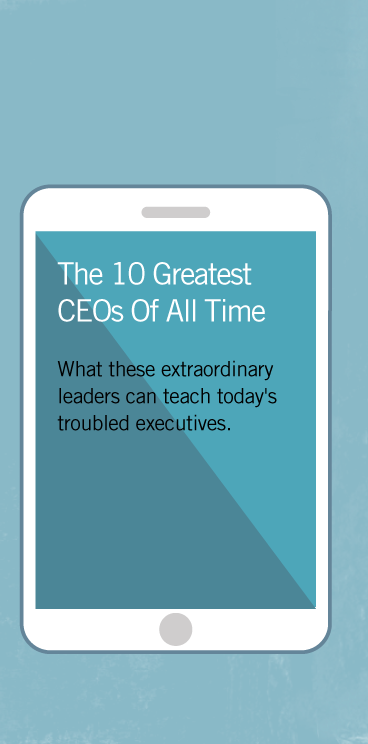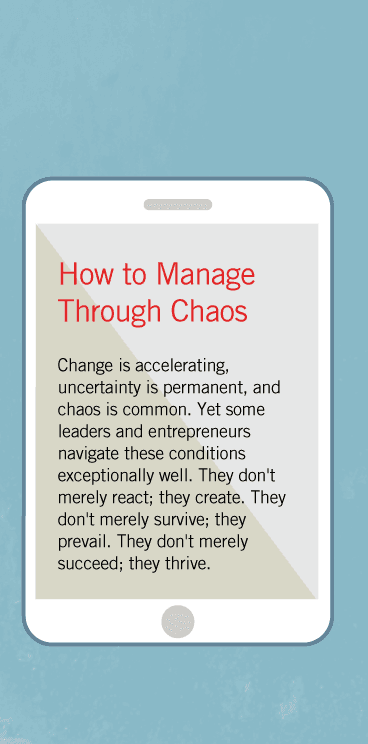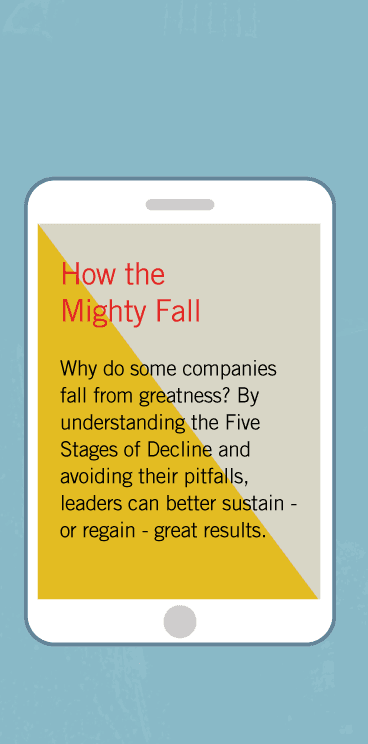Looking Out for Number One
Inc.
June 1996
Do you have a personal board of directors? I don’t mean a traditional
corporate board, nor do I mean an informal board of business advisors.
I mean a personal board of directors composed of seven
people you deeply respect and would not want to let down. A group
like a set of tribal elders that you turn to for guidance at times
of ethical dilemma, life transitions, and difficult choices, people
who embody the core values and standards you aspire to live up
to.
I came up with the idea for a personal board for my students at Stanford Business School, but over the years I've come to see its power and usefulness for anyone, especially for people actively engaged in starting and building companies. As Inc. readers are all too aware, the pressures of building a company can completely overwhelm and obscure your deeper goals, values, and life priorities. As the founder of a successful entrepreneurial company confided in me, "It's easy to get so wrapped up in building the company that you lose sight of what's really important in your life and why you have your company in the first place." When my personal board helped me see that my personal vision and the corporate vision were going in two different directions, I sold the company and got back to doing what I really love to do."
Used well, a personal board helps you find creative alternatives to life’s challenges and is a terrific place to turn for advice on handling crises and ethical dilemmas. One of my ex-students learned from a retired navy admiral and personal-board member that you are never under obligation to lie for anyone, not even the president of the United States. Early in his career, when the board member saw the White House pressure his fellow officers to support a fabricated story in the national interest, he remained calm. "They never put pressure on me on behalf of the president," he explained to my ex-student, "because they knew I'd just tell them to go jump in a lake." Says my former student, "That kind of piercing clarity certainly helped me resist pressures I was getting in my job to tell little lies on behalf of the company."
The personal board serves not only as a mechanism to preserve your core values but also as a way to stimulate self-renewal. Once when I was wrestling with a critical career adjustment, I met with one key board member. "How do you know when it's time to make a significant change?" I asked. "As soon as you feel the need to ask the question," he said. And so I changed. Indeed, good board members generally don't support the status quo!
Another former student of mine—call him Hans—used his personal board to force himself down an entrepreneurial path. Burdened with heavy school debts, Hans could not afford to forgo a big income immediately after graduate school. Yet members of his personal board advised him that the longer he stayed on the professional career track—accumulating houses, cars, and so on—the lower his odds of taking an entrepreneurial risk were. So, upon graduation, Hans made a commitment to each member of his personal board that he would quit his job within three years and strike out on his own. He also asked his personal board to hold him rigorously to that commitment. The board did, and Hans now runs his own company while most of his classmates (who also harbored entrepreneurial ambitions) languished in lucrative but unfulfilling jobs working for other people.
The best personal boards contain a diverse spectrum of backgrounds and perspectives. Members of my own personal board have come from many walks of life—an expert on personal creativity, a founder of a corporation, a fellow professor of entrepreneurship, a former Vietnam POW, and a public servant. Personal-board members should not be selected primarily for their ability to help you attain success in your business. Every board member should pass this litmus test: "If I were in a totally different profession or business—indeed, if I were not in business at all—would I still have this person on my board?"
Personal-board members from outside your profession or industry can help you overcome the limitations of conventional wisdom and remain true to your goals. After my book Built to Last became an international best-seller, the conventional wisdom was that I should capitalize on its success by writing another book right away and starting a consulting firm. Members of my board saw clearly that those activities would be inconsistent with my own goal of making a contribution through research and teaching: a rushed book would offer little additional contribution, and building a consulting firm would distract me from new creative work. My personal board helped me resist the pressures of the publishing industry and the lure of consulting revenues, and remain true to my own goal of maximizing my contribution to teaching, not my income.
Although some personal-board members will likely be close or intimate associates, they need not all be. You need know only enough about potential board members to feel confident that they meet the standards of thoughtfulness, insight, and experience you desire on your board. Respect for your board counts more than intimacy. Look for board members who, while strong in their views, are nonjudgmental and compassionate. The best board members dispense wisdom like Socrates—by asking questions, drawing analogies, and making dispassionate observations.
Paradoxically, remarkable people—those worthy of being personal-board members—tend to be unusually generous with their time. They seem to live by an implicit life contract to give of themselves for the development of others, perhaps as others had once done for them. Yet their very generosity requires that you be highly selective about when and how to call on them. For daily or noncritical decisions, you need not contact your board members. But you might keep a list of your board members easily at hand (on the wall, in a wallet, in a briefcase, whatever) and hold imaginary board meetings, envisioning what each board member might say about a given situation.
And what of "payments" to your personal board members? The best payment is simply to emulate them by giving time and guidance to others, especially younger people who need mentors. Additionally, most personal-board members appreciate being kept informed of your progress. In fact, it's good discipline to write a letter once a year or so to your board. That personal "annual report" not only keeps your board informed but also helps you clarify your own thinking and take stock of how you're doing.
Indeed, perhaps the most significant contribution the personal board can make is to help you attain self-knowledge and, ultimately, self-actualization. The board is like the mirror the psychologist Abraham Maslow spoke about when describing the human ascent up the hierarchy of needs: "The basic question is, what vision do you aspire to? If you really look in the mirror, what kind of person do you want to be?" The very process of assembling and making good use of a personal board is a conscious, deliberate step toward answering that question and, most important, living by it. For, as Maslow correctly pointed out, self-actualization "doesn't happen by accident."
I came up with the idea for a personal board for my students at Stanford Business School, but over the years I've come to see its power and usefulness for anyone, especially for people actively engaged in starting and building companies. As Inc. readers are all too aware, the pressures of building a company can completely overwhelm and obscure your deeper goals, values, and life priorities. As the founder of a successful entrepreneurial company confided in me, "It's easy to get so wrapped up in building the company that you lose sight of what's really important in your life and why you have your company in the first place." When my personal board helped me see that my personal vision and the corporate vision were going in two different directions, I sold the company and got back to doing what I really love to do."
Used well, a personal board helps you find creative alternatives to life’s challenges and is a terrific place to turn for advice on handling crises and ethical dilemmas. One of my ex-students learned from a retired navy admiral and personal-board member that you are never under obligation to lie for anyone, not even the president of the United States. Early in his career, when the board member saw the White House pressure his fellow officers to support a fabricated story in the national interest, he remained calm. "They never put pressure on me on behalf of the president," he explained to my ex-student, "because they knew I'd just tell them to go jump in a lake." Says my former student, "That kind of piercing clarity certainly helped me resist pressures I was getting in my job to tell little lies on behalf of the company."
The personal board serves not only as a mechanism to preserve your core values but also as a way to stimulate self-renewal. Once when I was wrestling with a critical career adjustment, I met with one key board member. "How do you know when it's time to make a significant change?" I asked. "As soon as you feel the need to ask the question," he said. And so I changed. Indeed, good board members generally don't support the status quo!
Another former student of mine—call him Hans—used his personal board to force himself down an entrepreneurial path. Burdened with heavy school debts, Hans could not afford to forgo a big income immediately after graduate school. Yet members of his personal board advised him that the longer he stayed on the professional career track—accumulating houses, cars, and so on—the lower his odds of taking an entrepreneurial risk were. So, upon graduation, Hans made a commitment to each member of his personal board that he would quit his job within three years and strike out on his own. He also asked his personal board to hold him rigorously to that commitment. The board did, and Hans now runs his own company while most of his classmates (who also harbored entrepreneurial ambitions) languished in lucrative but unfulfilling jobs working for other people.
The best personal boards contain a diverse spectrum of backgrounds and perspectives. Members of my own personal board have come from many walks of life—an expert on personal creativity, a founder of a corporation, a fellow professor of entrepreneurship, a former Vietnam POW, and a public servant. Personal-board members should not be selected primarily for their ability to help you attain success in your business. Every board member should pass this litmus test: "If I were in a totally different profession or business—indeed, if I were not in business at all—would I still have this person on my board?"
Personal-board members from outside your profession or industry can help you overcome the limitations of conventional wisdom and remain true to your goals. After my book Built to Last became an international best-seller, the conventional wisdom was that I should capitalize on its success by writing another book right away and starting a consulting firm. Members of my board saw clearly that those activities would be inconsistent with my own goal of making a contribution through research and teaching: a rushed book would offer little additional contribution, and building a consulting firm would distract me from new creative work. My personal board helped me resist the pressures of the publishing industry and the lure of consulting revenues, and remain true to my own goal of maximizing my contribution to teaching, not my income.
Although some personal-board members will likely be close or intimate associates, they need not all be. You need know only enough about potential board members to feel confident that they meet the standards of thoughtfulness, insight, and experience you desire on your board. Respect for your board counts more than intimacy. Look for board members who, while strong in their views, are nonjudgmental and compassionate. The best board members dispense wisdom like Socrates—by asking questions, drawing analogies, and making dispassionate observations.
Paradoxically, remarkable people—those worthy of being personal-board members—tend to be unusually generous with their time. They seem to live by an implicit life contract to give of themselves for the development of others, perhaps as others had once done for them. Yet their very generosity requires that you be highly selective about when and how to call on them. For daily or noncritical decisions, you need not contact your board members. But you might keep a list of your board members easily at hand (on the wall, in a wallet, in a briefcase, whatever) and hold imaginary board meetings, envisioning what each board member might say about a given situation.
And what of "payments" to your personal board members? The best payment is simply to emulate them by giving time and guidance to others, especially younger people who need mentors. Additionally, most personal-board members appreciate being kept informed of your progress. In fact, it's good discipline to write a letter once a year or so to your board. That personal "annual report" not only keeps your board informed but also helps you clarify your own thinking and take stock of how you're doing.
Indeed, perhaps the most significant contribution the personal board can make is to help you attain self-knowledge and, ultimately, self-actualization. The board is like the mirror the psychologist Abraham Maslow spoke about when describing the human ascent up the hierarchy of needs: "The basic question is, what vision do you aspire to? If you really look in the mirror, what kind of person do you want to be?" The very process of assembling and making good use of a personal board is a conscious, deliberate step toward answering that question and, most important, living by it. For, as Maslow correctly pointed out, self-actualization "doesn't happen by accident."
Copyright © 1996 Jim Collins, All rights reserved.






